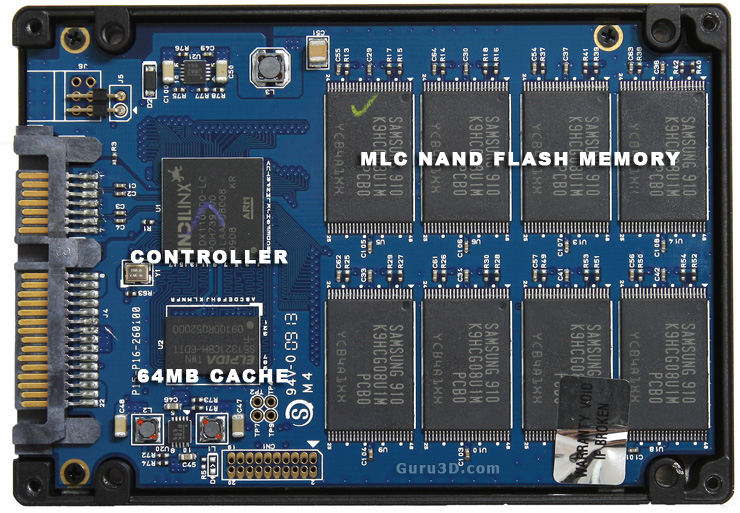G.Skill Series SATA II 2.5" SSD - 128GB
G.Skill Falcon Series SATA II 2.5" SSD - 128GB
So today we are testing the G.Skill Falcon series SSD. With a close eye on the market, G.Skill is now also stepping away from JMicron controllers inside that SSD. As such we see that the Falcon has an Indilinx controller which is tied to 64MB cache memory. Indilinx, sounds familiar eh? That's a spin-off company from Mtron, known for their quality server SSDs, and yes .. the very same controller is used on OCZ's Vertex line of products.
The choice of using an Indilinx controller inside the Falcon brings several advantages to this product in terms of overall speed and performance thanks to some additional bandwidth, reducing latency and overall throughput.
Now the controller itself is not faster or massively better than the ones used on cheaper SSD drives (JMicron) but the one thing that is important is cache memory. SSDs need to fight off a bad habit, slow write times for really small and petit files, that is where the sore bottleneck of SSD drives is to be found.
The trick is that the Indilinx controller can be tied (and is) to an SDRAM buffer, 64MB to be precise, and that my friends helps massively in tackling the small write access issues I just mentioned. Have a look at the innards:

In the above photo we see the SSD all nekked. To the right the Samsung flash memory chips, to the upper left the Indilinx Barefoot controller chip and just below it 64MB cache memory from Elpida. All combined they form the heart and soul of the Falcon series SSD.
The Falcon series is available in several capacities of 64GB, 128GB and 256GB: the read/write performance of the 128GB and 256GB drives are specified as 230/190 MB/Sec, while the 64GB drives are capable of a slightly slower write speed at 135 MB/Sec. Continuing, the seek time on these puppies is even more amazing; at less than 1ms -- 0.1ms as we actually can measure. The average seek time for a traditional HDD is roughly 9ms. Do the math.
These SSD drives will cost you roughly 80 to 100 USD per 32GB. The flash memory NAND type used is MLC.
These factors combined are important. The speed will increase your overall PC experience, as the vertebrae of overall system speed and performance is your boot drive. Also, storage performance like this would, for example, greatly enhance load times of games.
Not bad for a product weighing 77 grams. Here are some features:
Features:
- Available in 64, 128 and 256MB capacities*
- 64MB Onboard Cache
- Seek Time: <0.1ms
- Slim 2.5" Design
- 99.8 x 69.63 x 9.3mm
- Lightweight 77g
- Operating Temp: -10C ~ +70C
- Storage Temp: -55C ~ +140C
- Low Power Consumption: 2W in operation, 0.5W in standby
- Shock Resistant 1500G
- RAID Support
- MTBF 1.5 million hours
- 2 year warranty
- Read: Up to 230 MB/s
- Write: Up to 190MB/s (130 MB/s for 64GB model)
G.Skill also labels the product a MTBF (Mean Time Before Failure) of 1.5 million hours. I mentioned this a couple of times already but that really is a highly statistical figure and I just wish SSD manufacturers would just drop this value.
It would be more interesting to see a value in terms of lifespan. E.g. if you write 10GB of data per day, how long would it take before a drive would wear out completely. Some numbers say with average daily usage, the MLC drives will last ten years. But only the future will tell really. Heck, a traditional HDD can die within 2 years just as well.
The drive we are testing today will cost you the pretty sum of roughly 349 USD / 300 , and priced similarly to the OCZ Vertex 120GB it is armed with a two year warranty. On the topic of warranty, the one thing I'd like to see improved is warranty, we say 5 years would be a very plausible term in this price range.
